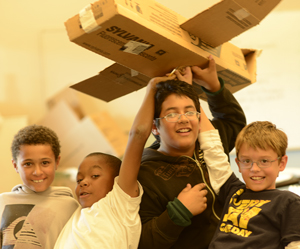Ryan Wallace left his big, cliquish high school last spring for The Foundation Academy, a non-denominational Christian school with vegetable gardens and an aquaponic farm. “I wanted a chance to try something new,’’ said Ryan, now a 17-year-old junior planning a dodge-ball fundraiser for his class president campaign.

Boys in Aaron Unthank's single-gendered fifth- and sixth-grade class learn from each other, too. The setup gives Unthank more freedom to cater classes to meet boys' learning styles.
Twelve-year-old Marc’Anthony Acevedo came to the academy as a second-grader after being bullied at his old school. This year, he’s part of a single-gendered class of fifth- and sixth-grade boys. “Sometimes we have arguments, but we get over it,” he said. “We’re all friends.’’
For Cori Hudson, the Foundation was his last shot at a diploma. He messed up at the school district’s option of last resort. “I come to school every day now,’’ said the 16-year-old. “I feel like school is the most important thing to me.’’
These transformations are exactly what principal Nadia Hionides hoped for when she started the academy near Jacksonville Beach, Fla. nearly 25 years ago.
With a style that’s part Montessori, part Waldorf, the Foundation offers hands-on, project-based learning with a college-preparatory curriculum based on the philosophy that everyone learns differently.
The school has 280 students in kindergarten through 12th grade; 100 are in high school. They share a 23-acre campus that Hionides and her husband, a ship deck builder and painter, bought in 2008 for $600,000. The couple spent another $5 million for eight, prefabricated steel structures, which include a front-office foyer where the floor is made from vinyl records.
Tuition starts at $6,000 a year. But 81 students receive tuition assistance from Step Up For Students, the nonprofit that administers Florida’s tax-credit scholarship program for low-income kids and co-hosts this blog.
The academy separates students into groups of two grade levels - kindergarten and first-graders, second- and third-graders, etc.
“Because that’s real life,’’ Hionides said. Also, “they push each other to shine.’’
It seems to work in the fifth- and sixth-grade boys’ class – for the students and their teacher.
“It’s fantastic,’’ said Aaron Unthank, a longtime private school music teacher and baseball coach. “There’s a different kind of camaraderie as a class and there’s a lot more freedom I have as a teacher to talk about guy things.’’
The younger boys learn from the older boys, and the older boys gain confidence, Unthank said. He paraphrased Einstein: “You don’t know a thing well enough unless you can talk about it.” (more…)
Editor's note: The debate over school choice might be less tense if we heard more from the parents, teachers and principals who have decided an alternative setting is best. Nadia Hionides, who recently penned a heartfelt letter to The Beaches Leader newspaper in Jacksonville Beach, Fla., offers a good example. Hionides runs The Foundation Academy private school in Jacksonville, where about 90 of 280 students benefit from tax credit scholarships for low-income students. As her letter shows, her goals aren't privatization and profits; they're justice, equity and diversity. She credits Florida's two K-12 private-option programs - tax credit scholarships (administered by Step Up For Students) and McKay scholarships for disabled students - with helping her school reach those schools. Below is her letter. Hat tip to Elizabeth Watson, Step Up's director of operations support services, for sending the letter our way.
 I am an educator for 35 years, a school owner and principal for 25 years.
I am an educator for 35 years, a school owner and principal for 25 years.
I came into the profession to help promote equity and justice in America.
We are all unique and creative beings. There is no one size fits all way of learning and growing into successful, compassionate, well-adjusted people.
I cannot think of a better way to promote equity and justice in education than through the Step Up/McKay scholarships.
These scholarships not only equalize the playing field economically but allows those in poverty to enhance the lives of the economically privileged by being in the same private schools.
We all gain in a diverse environment. We all lose in segregated settings.
Myself, my students, my teachers and my community are all blessed through this amazing scholarship.
No child left behind can be accomplished if all private schools participate.
Only in the diversity of private school choices, along with public school, can we meet the diversity in children and achieve successful, well-educated, globally competitive students.
I am privileged to be part of something that changes lives.